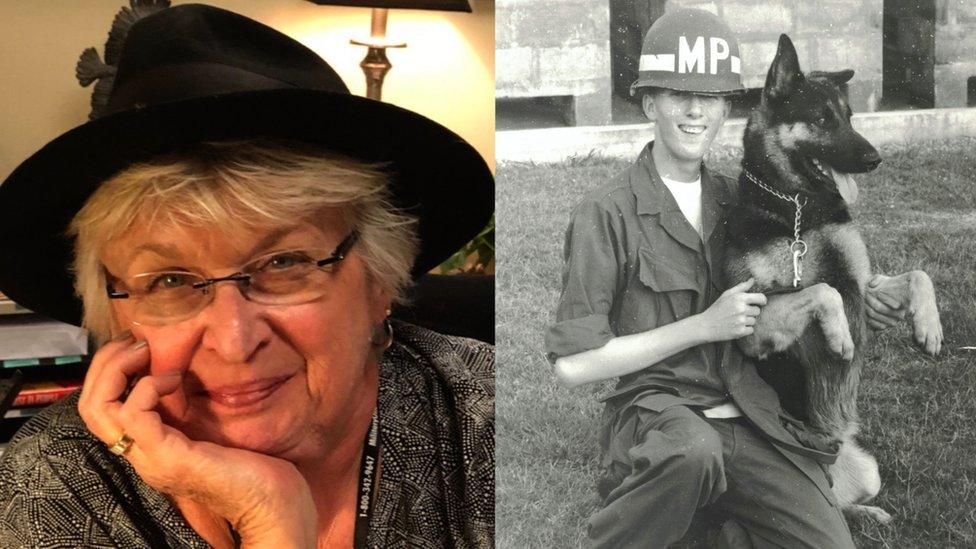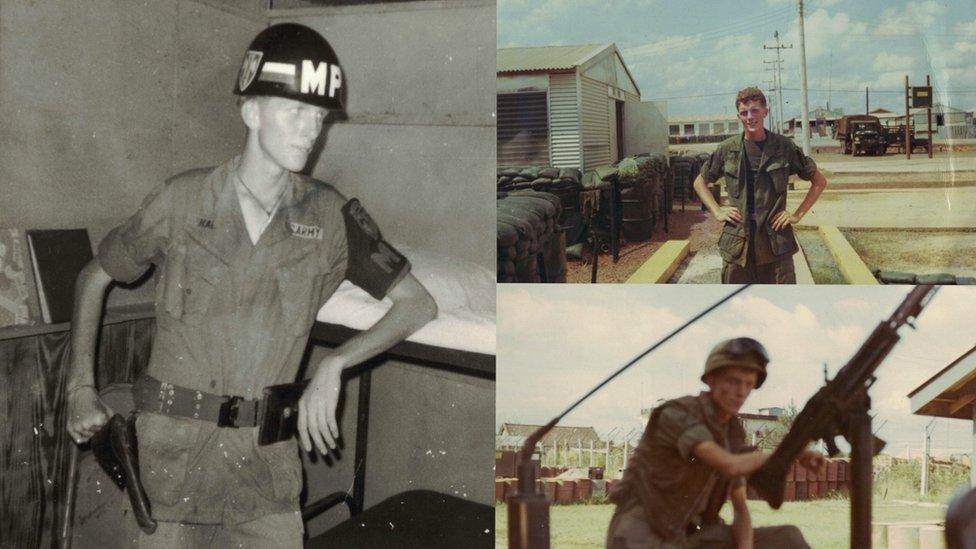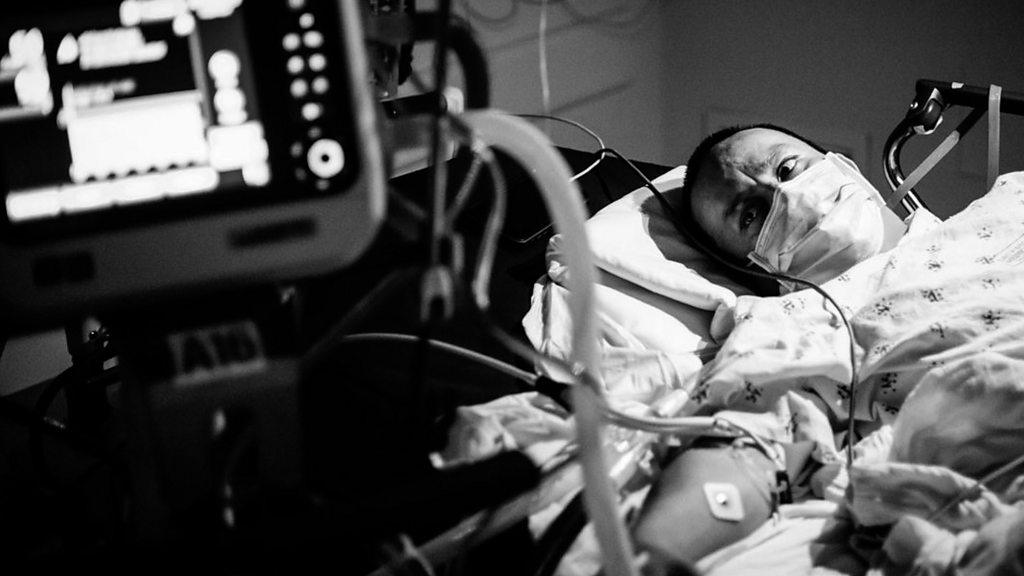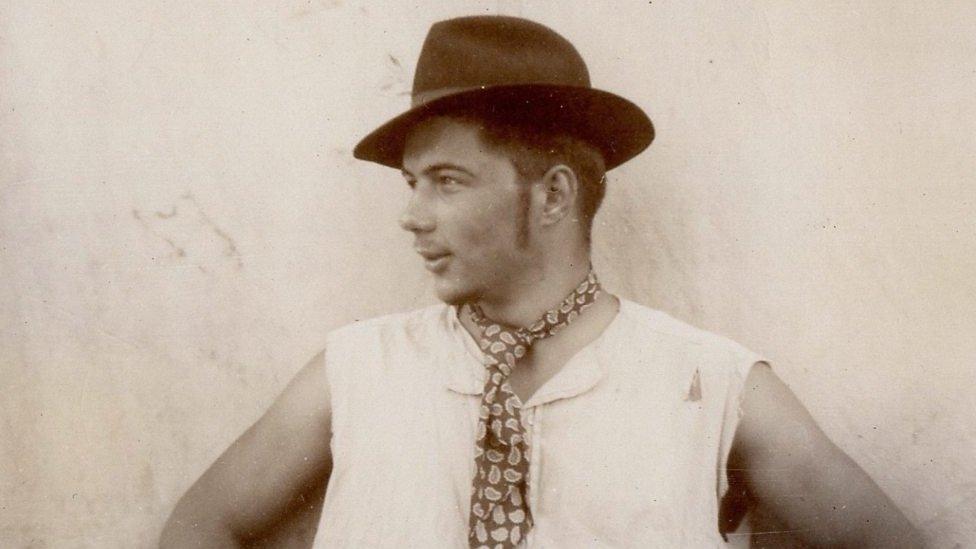Is fighting a pandemic like fighting a war?
- Published

Is fighting a pandemic like fighting a war? Two Vietnam veterans - Thomas Hall, in Kansas, and Marsha Four, in Philadelphia - talk about their wartime experience, the coronavirus, and the parallels they see between the two.
Marsha spent three years in Vietnam as a US army nurse, stationed on the front lines in a critical care unit.
It was, she recalls, "in many ways a very dark time" in her life.
War "embraces you - good or bad it becomes the only world that you live in. Nothing else exists but that war and your safety and the work you have to do inside of it", she says.
Tom was 20 years old when he stepped off a plane in Saigon.
"As Marsha said we were all very young. And I just looked at it kind of 'Oh, what's this.' I went through a myriad emotions I wasn't even aware of."
He served as a military police sentry and dog handler in 1969 and 1970, working mostly at night, alone, patrolling landing zones or large bases.
The emotion he felt on those first deployments "was abject fear", he recalls. "You kind of have to get over that and say what's going to happen will happen, and you just do it."

He is now national chair of the post traumatic stress and substance abuse committee for Vietnam Veterans of America.
Numbing emotions, he says, "that's a good thing in a war zone. Not so good when you come back to your country and be in a civilian world".
Using war metaphors when referring to efforts to fight the pandemic is fair, he believes.
"It's an invisible enemy," he says. "It's killing people at random and if we don't marshal all our resources and get focused on that, then it will overrun us."
He adds: "Front-line workers, they're dying. Nurses and doctors have died fighting this, just like in a war. And they're putting their lives on the line, just like in a war. I think the parallels are innumerable. I don't think it's a stretch at all."

Find out more
The interview with Marsha and Tom was part of BBC OS Conversations on the BBC World Service

Marsha agrees, saying she sees a parallel between the work of healthcare workers in the pandemic and what nurses and doctors had to do during Vietnam.
"When you look at what the individuals had to endure during this time - everyday was total chaos, everyday they had to live under the stress and anxiety not only of the work that was demanded of them," she says, adding "there was the loss of the humanity that was laid at their hands.
"They had no control over the pain of seeing these individuals who were losing their lives, who were slipping away, and their families were not with them."
She said patients in Vietnam died alone, without the comfort of their loved ones.
The front-line doctor photographing the pandemic
"They looked at us as their mothers, their wives. We were the ones that helped them across to the other side. We gave them the strength and we gave them the courage to let go, and that all would be well," she says.
She adds: "When you look at what the staff in the hospitals are going through today there is an overwhelming comparison with some of the things that we had to experience."
In the US, over half a million lives have been lost in just over one year, more than the American death tolls from World War 1, World War 2 and the Vietnam War combined.
And like with war, Tom expects the pandemic will have a lasting impact on those who worked on the front lines. Normal emotions need to be turned down while in the midst of it all, he says.
Later, that act of self-preservation can create a feeling of distance, an isolation from others.
"Nobody understands exactly what you've been through," he says.
"There were several million people who went to Vietnam and everybody had a different war," he adds. "The idea of everybody being in the same situation that experienced battling Covid on the front-line health professions - each of them will be dealing with different issues that will colour the arc of their life. They will not be the same, after this."
Related topics
- Published1 March 2021

- Published22 February 2021
